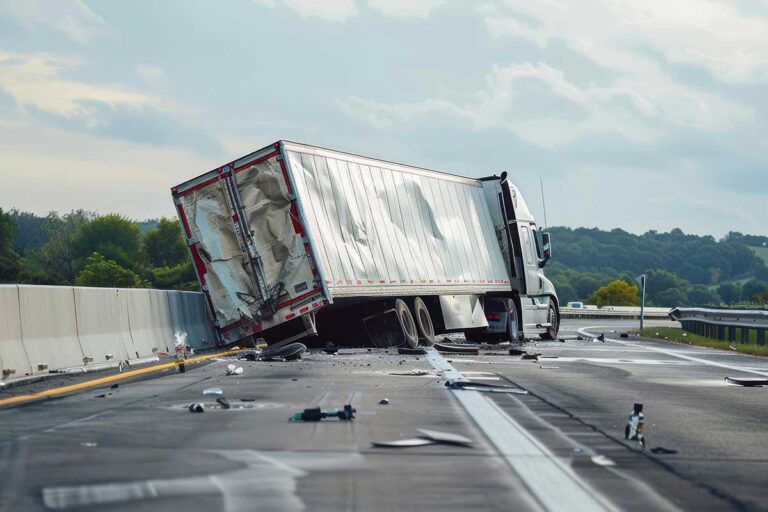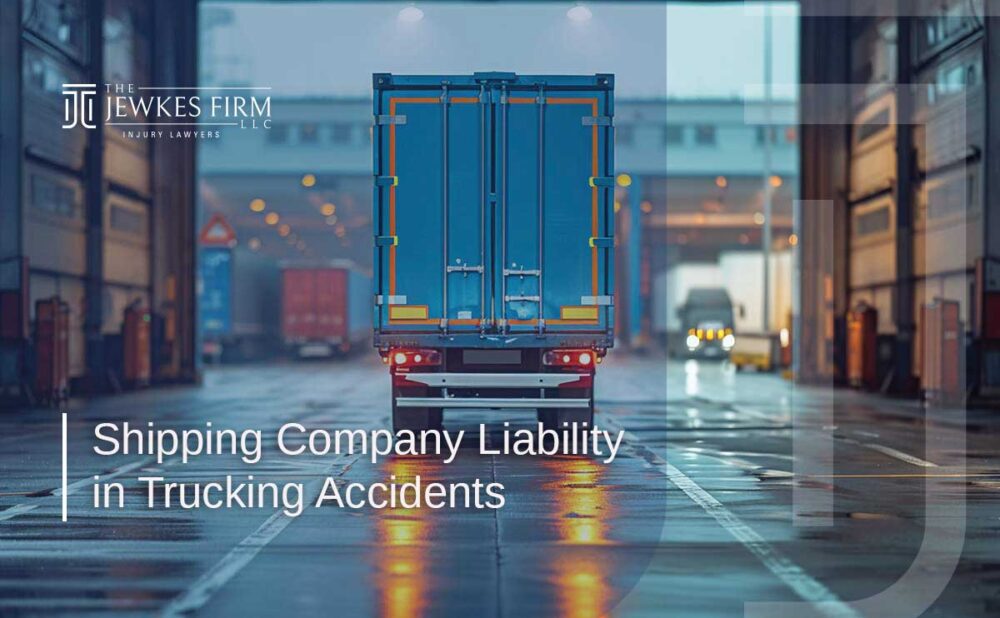Shipping Company Liability in Trucking Accidents
Truck accidents are a significant concern on our roadways, often stemming from unsafe driving practices or violations of traffic regulations by truck operators. However, the responsibility can also extend to shipping companies, particularly in cases of improper cargo handling or inadequate driver training. Understanding the multifaceted nature of liability in trucking accidents is vital for victims seeking justice.
If you have experienced injuries from a trucking accident, it is crucial to seek the assistance of an experienced truck accident attorney. The Jewkes Firm can advocate on your behalf through every phase of the legal process, from filing claims to negotiating with insurance representatives, ensuring you receive the best possible outcome. Reach out today at (770) 771-5130 for a free, no-obligation consultation.
How Do Shipping Companies Contribute to Accidents?
Shipping companies play a crucial role in the logistics industry, but their operations can sometimes lead to truck accidents. When such incidents occur, determining liability can be complex. Shipping companies can be held accountable for truck accidents in several situations, particularly when their actions or negligence contribute to the accident. Here are key factors that may lead to their liability:
Negligent Hiring and Training Practices
One of the primary ways a shipping company can become liable for accidents is through negligent hiring and training. If a company hires drivers without proper background checks, particularly those with a history of traffic violations, it may face legal repercussions. Moreover, inadequate training in safety protocols can lead to dangerous situations on the road. Companies must ensure that all drivers are thoroughly trained to handle their vehicles and follow safety regulations to mitigate the risk of accidents.
Neglecting Vehicle Maintenance
It is imperative for shipping firms to ensure their vehicles are well-maintained. Neglecting routine inspections and repairs can result in mechanical failures leading to accidents. For instance, a failure to maintain brakes that leads to a collision could establish grounds for liability. Routine maintenance is not just about compliance; it is a vital aspect of ensuring the safety of drivers and others on the road.
Promoting Unsafe Driving Practices
Shipping companies that impose unrealistic delivery timelines can inadvertently promote unsafe driving behaviors among their drivers. Some shipping companies may pressure drivers to meet unrealistic deadlines, encouraging them to operate their vehicles for extended periods without adequate rest. This leads to fatigue, a significant contributor to accidents. If a company coerces its drivers into violating Federal Motor Carrier Safety Administration (FMCSA) regulations regarding driving hours, they may be held liable for subsequent incidents.
Noncompliance with Safety Regulations
Shipping companies must adhere to a variety of safety regulations that govern cargo handling, vehicle maintenance, and driver conduct. Failure to comply with these regulations can result in liability in the event of an accident. For instance, if cargo is not properly secured and shifts during transport, causing a loss of vehicle control, the company may be found liable for any ensuing damages or injuries.
Liability for Employee Conduct
Typically, shipping companies are responsible for their employees’ actions while on duty. If a truck driver engages in reckless behavior leading to an accident, the company may be held liable for their employee’s actions.
Shipping companies and truck accidents are linked by various factors that contribute to potential liability. By understanding these key areas—negligent hiring and training, vehicle maintenance, unsafe practices, regulatory compliance, and employee actions—companies can take proactive steps to enhance safety and reduce the risk of accidents. In doing so, they not only protect their drivers and cargo but also contribute to safer roads for all.
Injured In A Truck Accident? Contact Us For A Free Consultation
Injured In A Truck Accident?

Types of Injuries Associated with Truck Accidents
Truck accidents frequently lead to significant injuries, primarily because of the massive size and weight of the trucks involved. The aftermath of such incidents often leaves victims facing not only physical challenges but also emotional and psychological struggles. The following are some common injuries sustained in these incidents:
Traumatic Brain Injuries (TBI)
One of the most critical injuries arising from truck accidents is traumatic brain injury (TBI). The force from a collision can cause a victim’s head to collide with hard surfaces, leading to concussions or severe brain injuries that impact cognitive functions and quality of life. The repercussions of TBIs can be long-lasting, affecting cognitive abilities, memory retention, and even personality traits. As a result, victims might require comprehensive medical intervention and rehabilitation.
Spinal Cord Injuries
The violent nature of these collisions can lead to injury of the vertebrae, intervertebral discs, or the spinal cord itself, which may result in partial or complete paralysis. Such life-altering injuries substantially impact a victim’s mobility and independence, affecting their ability to work and carry out everyday tasks. The road to recovery often involves extensive rehabilitation and costly medical care.
Fractures and Broken Bones
Fractures are common due to the high-impact nature of truck collisions, ranging from simple breaks to compound fractures requiring surgical intervention.
Internal Injuries
Trauma from truck accidents can cause internal bleeding and damage to vital organs, which may not be immediately evident but can be life-threatening.
Whiplash and Neck Injuries
A sudden jolt can lead to neck injuries like whiplash, resulting in pain and limited movement, often necessitating physical therapy.
Burns and Fire-Related Injuries
Accidents involving fires can lead to severe burns, requiring long-term medical care. Survivors may endure severe burns that can lead to debilitating pain, extensive scarring, and permanent disfigurement. Treatment for burn injuries frequently involves multiple surgeries, skin grafts, and ongoing care.
Psychological Impact
Lastly, the psychological repercussions of truck accidents are frequently underestimated. Survivors may develop post-traumatic stress disorder (PTSD), anxiety, or depression as a response to their traumatic experiences. These mental health issues can be as debilitating as physical injuries, and they often necessitate professional psychological support and treatment.
The injuries sustained in trucking accidents can be severe and multifaceted, affecting victims’ physical, emotional, and psychological well-being. It is crucial for those involved in such incidents to seek immediate medical care and ongoing support to navigate the complex recovery process. Understanding the potential for these injuries can aid in fostering awareness and improving safety measures within the trucking industry.

GEORGIA PERSONAL INJURY LAWYER NEAR ME

Establishing Liability Against Shipping Companies in Trucking Accidents
Determining whether a shipping company bears responsibility for a truck-related accident requires a meticulous approach to evidence gathering and a clear demonstration of negligence. Below, we outline essential steps for establishing liability effectively.
Accident Scene Investigation
Document the scene thoroughly with photographs and videos, paying attention to vehicle positions, road conditions, and damages. Statements from eyewitnesses can provide crucial insights into the accident.
Police Reports
Obtain the police report, which includes the officer’s findings and may highlight any traffic violations, serving as essential evidence. A police report serves as a key piece of evidence in establishing the shipping company’s liability.
Investigating Driver Credentials and Logbook
Review the truck driver’s logbook for compliance with regulations regarding driving hours, which can indicate fatigue-related errors. Fatigue is a significant factor in accidents, and overworked drivers pose a higher risk. Additionally, assess the driver’s history for any past violations or accidents, which may indicate a pattern of irresponsible behavior.
Maintenance Records
Trucking firms are legally obligated to maintain their fleet in safe operating condition. Request access to the truck’s maintenance records to determine whether it underwent regular inspections and repairs. Lapses in maintenance can lead to mechanical failures, directly contributing to accidents.
Company Policies
Investigate the operational policies and practices of the shipping company. If evidence emerges that the company fosters unsafe practices—such as pressuring drivers to meet tight deadlines—this can serve as a significant indicator of negligence.
Expert Testimony
Consider employing experts in accident reconstruction who can analyze the evidence and provide professional insights into how the accident transpired. Their evaluations can be instrumental in determining whether the truck driver or the shipping company holds responsibility.
Regulatory Compliance
Shipping companies must adhere to regulations set forth by entities like the Federal Motor Carrier Safety Administration (FMCSA). Documenting any breaches, such as failure to conduct mandatory drug tests or disregard for safety protocols, can offer compelling proof of liability.
Electronic Evidence
Truck drivers use electronic logging devices (ELDs) and GPS systems, which can yield critical information regarding the vehicle’s speed, braking behavior, and the driver’s logged hours. This data can be key in substantiating claims of negligence or improper conduct.
Legal Representation
Engaging a legal professional with expertise in truck accident cases can be invaluable. An attorney can assist in the evidence collection process and navigate the complexities of legal proceedings to ensure all pertinent information is effectively utilized.
By following these outlined steps, you can construct a robust case to demonstrate that a shipping company is liable for a truck accident. A thorough investigation, detailed documentation, and expert testimony are vital components in establishing negligence and holding the responsible parties accountable.
Need a Free Consultation? Need a Skilled Attorney?
Free Consultation
Call (770) 771-5130
If you’ve been injured, you need to hire the best legal care to assist you with your claim. Get a FREE consultation today!
Seeking Compensation for Damages in a Shipping Company-Related Accident
In the unfortunate event of a trucking accident caused by the negligence of a shipping company, individuals may have the right to pursue various forms of compensation. This financial restitution aims to address the damages and hardships experienced as a result of the incident. Below, we explore the primary categories of compensation available to victims:
Medical Expenses
Victims of trucking accidents can claim compensation for all medical-related expenses incurred due to their injuries. This encompasses a wide range of costs, including but not limited to:
- Hospital Admissions. Charges for emergency services and overnight stays.
- Medical Procedures. Costs associated with surgeries or specialized treatments.
- Follow-Up Appointments. Payments for consultations with healthcare professionals.
- Rehabilitation. Expenses related to physical therapy or occupational therapy.
- Medications. Prescription drugs required for recovery.
- Future Medical Care. Anticipated costs for ongoing treatment necessary for long-term recovery.
Maintaining comprehensive documentation of all medical expenditures is crucial for substantiating claims.
Lost Wages
Injuries from a trucking accident can hinder a person’s ability to work, leading to lost income. Compensation for lost wages can cover:
- Salary or Hourly Wages. The income that would have been earned during the recovery period.
- Bonuses and Commissions. Any additional earnings that may have been lost due to time off work.
- Future Earnings. If injuries result in permanent disability, individuals may claim for potential future lost earnings or diminished earning capacity.
It’s important to provide proof of employment and income to support these claims.
Pain and Suffering
This category addresses both the physical pain and emotional distress resulting from the accident including:
- Severity of Pain. The intensity and duration of physical discomfort experienced.
- Recovery Duration. The length of time needed to recuperate.
- Impact on Quality of Life. How the injuries adversely affect day-to-day living and personal enjoyment.
Calculating pain and suffering can be complex and often requires expert testimony or detailed personal accounts.
Loss of Consortium
When an accident disrupts familial relationships, victims may seek compensation for loss of consortium. This covers:
- Companionship. The emotional support and companionship lost due to the injuries.
- Affection. Diminished intimacy and affection in marital relationships.
- Support. The practical help and assistance that family members can no longer provide.
This compensation acknowledges the broader emotional and relational impact of the accident on both the victim and their loved ones.
Punitive Damages
In instances where the shipping company’s negligence is particularly severe, punitive damages may be awarded. These damages serve to:
- Punish the Negligent Party. To hold the shipping company accountable for reckless actions.
- Deter Future Negligence. To discourage similar conduct in the future by other companies.
While punitive damages are less common, they can be significant, particularly in cases involving gross negligence or malice.
In summary, victims of trucking accidents caused by shipping company negligence have multiple avenues for seeking compensation. Understanding these categories is essential for navigating the recovery process and ensuring that all losses are adequately addressed. Always consider consulting with a legal professional to guide you through the complexities of your case.

The Litigation Process for Truck Accident Cases Involving Shipping Companies
When a truck accident occurs due to the negligence of a shipping company, the process of seeking compensation for damages can be intricate. Understanding the steps involved can significantly aid in navigating this legal landscape. Here’s a detailed guide to the litigation process:
Initial Legal Consultation
The journey begins with a consultation from a skilled attorney who specializes in truck accident cases. During this meeting, the attorney will evaluate the specifics of your incident, consider the potential strengths and weaknesses of your case, and provide insights into your legal rights and options moving forward.
Evidence Gathering and Investigation
Following the consultation, your attorney will embark on a meticulous investigation to compile evidence that supports your claim against the shipping company.
- Accident Report. Securing the official report detailing the incident.
- Witness Statements. Collecting testimonies from individuals who witnessed the accident.
- Medical Records. Reviewing health documentation that outlines your injuries.
- Maintenance Logs. Inspecting the truck’s maintenance history to identify any negligence.
- Electronic Data. Analyzing available data from the truck’s onboard systems, which may provide insights into the circumstances leading to the accident.
Filing the Lawsuit
If negotiations with the shipping company’s insurance representatives fail to yield a satisfactory settlement, your attorney will file a lawsuit in the appropriate court. This legal document will detail the accident, your injuries, and the rationale for holding the shipping company accountable.
Discovery Process
The discovery phase is a critical stage where both parties exchange pertinent information. This may involve:
- Interrogatories. Written questions that require responses from the opposing party.
- Document Requests. Demands for specific documents related to the case.
- Depositions. Interviews under oath of witnesses and experts, aimed at uncovering facts and strengthening your position.
Your attorney will leverage this phase to reinforce your case and counter any defenses presented by the shipping company.
Pretrial Motions
Before the trial, both parties may file pretrial motions. These can include requests to admit or exclude certain pieces of evidence, motions for summary judgment, or other procedural matters that could influence the trial’s direction.
Trial
Should the case advance to trial, your attorney will present your argument before a judge or jury. They will articulate how the shipping company’s negligence directly led to the accident and your subsequent injuries, supported by witnesses, experts, and compiled evidence.
Verdict and Judgment
The court will decide the outcome based on the evidence presented. If the judge or jury finds the shipping company liable, they will determine the compensation amount for your injuries and damages.
Appeals (if necessary)
If there is disagreement with the trial court’s ruling, either party may file an appeal in a higher court. The appeals process evaluates whether any legal missteps during the trial impacted the final decision.
Settlement Negotiations (if necessary)
Throughout the litigation process, your attorney will work diligently to negotiate a fair settlement that adequately addresses your injuries and losses, potentially avoiding the need for a trial.
Legal Support for Accident Victims
Navigating a truck accident case involving a negligent shipping company can be daunting. However, with the expertise of a dedicated truck accident attorney, you can effectively pursue the compensation you deserve for the injuries and damages sustained. If you’ve been injured, call The Jewkes Law Firm today at (770) 771-5130 to secure the maximum compensation you deserve.





